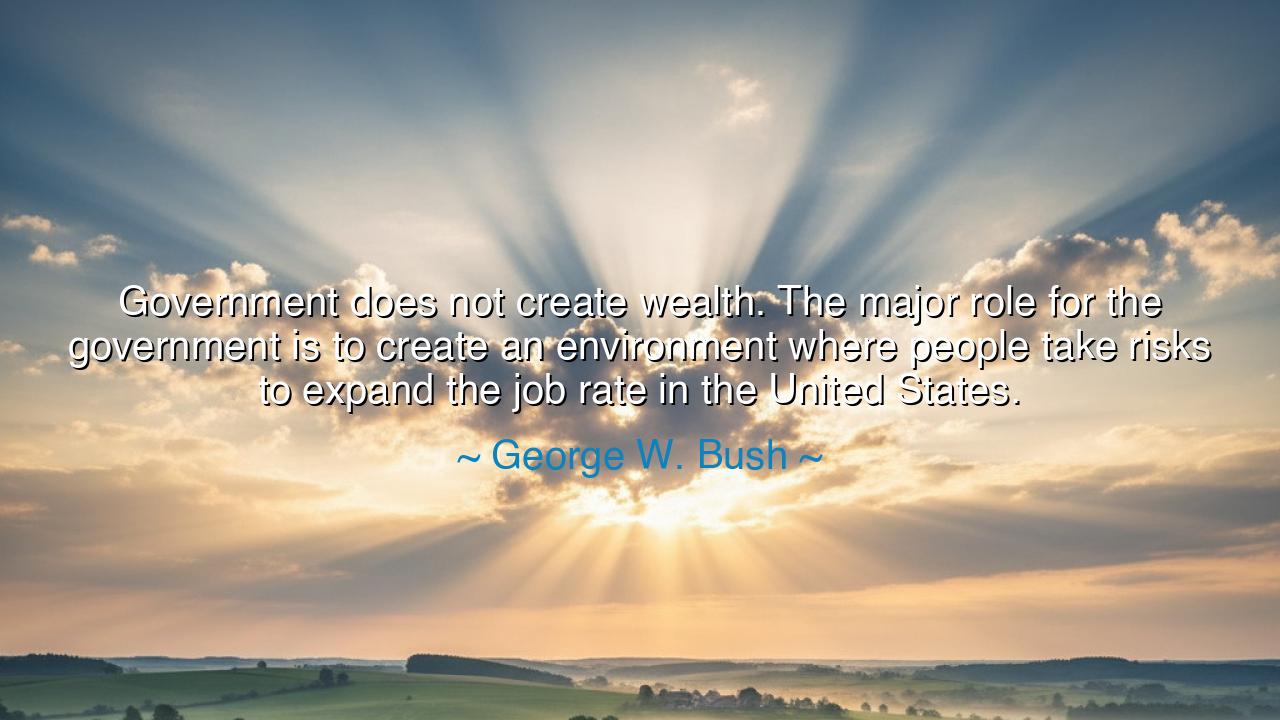
Government does not create wealth. The major role for the
Government does not create wealth. The major role for the government is to create an environment where people take risks to expand the job rate in the United States.






“Government does not create wealth. The major role for the government is to create an environment where people take risks to expand the job rate in the United States.” — Thus spoke George W. Bush, the forty-third president of the American Republic, in an age of uncertainty and ambition, when the balance between liberty and leadership hung in delicate measure. His words carry the rhythm of a timeless truth, one that echoes through the corridors of civilization: that wealth is not born in the halls of power, but in the hearts of the people. Government may guide, protect, and uphold, but the spark of creation — the seed of prosperity — lies within the individual who dares to dream, to labor, and to risk.
For what is wealth, if not the fruit of human effort, imagination, and courage? Kings may decree, parliaments may legislate, and councils may tax or spend, yet not one of them can summon bread from the soil or forge steel from the earth. Those miracles belong to the hands and minds of men and women who work, who trade, who innovate. When Bush declared that government does not create wealth, he spoke against the ancient temptation of rulers to see themselves as the source of prosperity — to forget that power can only redistribute what enterprise has first produced. The government is the gardener, not the vine; its duty is to cultivate the soil of freedom, not to harvest the labor of its citizens.
Consider the tale of America’s Industrial Revolution, when factories rose like temples and railroads stitched the continent together. The government did not invent the steam engine, nor the telegraph, nor the light of Edison’s bulb. It was the daring of individuals — men and women who risked failure, ridicule, and ruin — that brought forth an age of progress. Yet this flourishing was possible only because the state upheld laws of fairness, property, and trade; because it built roads and safeguarded peace; because it created the environment in which enterprise could bloom. Thus, Bush’s words honor the eternal balance: the people create the wealth, and the government’s noblest purpose is to guard the freedom that makes such creation possible.
But history, too, offers its warnings. When governments forget their place and seek to command the marketplace, when they smother initiative with regulation or crush risk with dependency, then the spirit of creation withers. So it was in the waning days of the Soviet Union, where the state claimed to produce all wealth, yet the shelves were bare and the hearts of men were weary. Factories worked without purpose, workers labored without reward, and innovation died in the silence of fear. The lesson is plain as sunlight: wealth cannot be commanded — it must be inspired.
Bush’s wisdom stands upon this ancient foundation — that freedom and responsibility are the twin engines of prosperity. The role of the state is not to compete with its citizens, but to empower them: to build roads, not barriers; to open doors, not dictate paths. When a people are free to strive and to fail, they learn resilience; when they are free to dream, they build nations. The duty of government, therefore, is to keep the path clear — to ensure justice, protect property, uphold peace — and then to stand aside while the courage of its citizens gives life to the economy.
This truth is not merely political; it is spiritual. For to create wealth is to participate in the act of creation itself — to bring forth something new from the raw materials of the world. It demands faith, risk, and endurance. Every small business begun, every field tilled, every invention tested, is a quiet act of hope. And hope, like freedom, cannot be legislated. It must be protected, not produced. The wise government, then, is not the father who provides all things, but the guardian who ensures that every child may grow strong through his own labor.
So, my children, remember this teaching: do not look to government for prosperity — look within yourself and your community. The state can lay the foundation, but it is your courage that raises the walls. Let the government safeguard peace, but let your own hands build the future. Honor laws that protect enterprise, and resist those that suffocate it. Celebrate the men and women who take risks — for in their daring lies the wealth of nations.
For as long as people are free to labor, to risk, and to dream, a nation will never hunger. But when they surrender those freedoms in exchange for comfort, even the richest government will find itself poor in spirit. Thus, heed the wisdom of Bush’s words: the essence of prosperity is liberty, and the duty of government is to keep that liberty alive.






AAdministratorAdministrator
Welcome, honored guests. Please leave a comment, we will respond soon